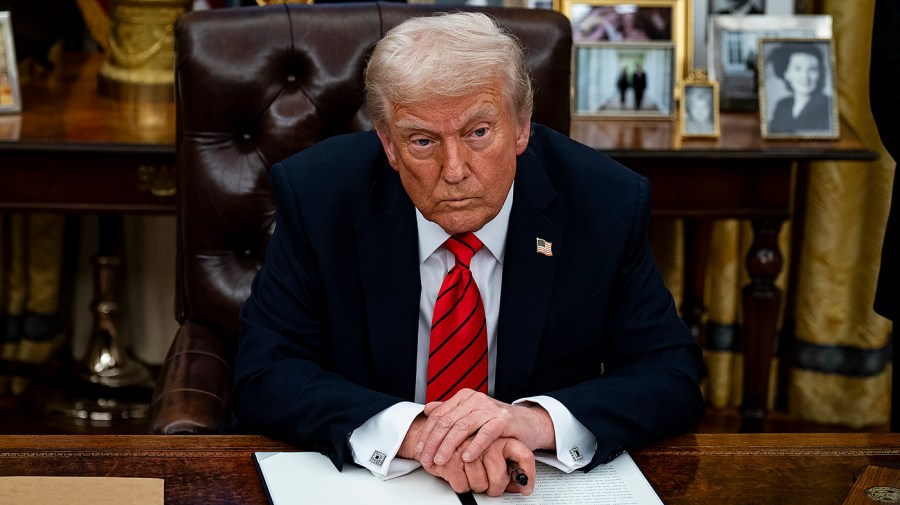
Within hours of taking his oath, President Trump passed executive orders that undermine gender equality here in the U.S. by defunding domestic violence programs, denying transgender identity and launching a witch-hunt against federal employees involved in DEI initiatives.
However, many overlook the profound impacts that Trump’s actions will have on gender equality beyond U.S. borders — including specifically sexual and gender-based violence.
Since Inauguration Day, the Trump administration has taken numerous actions that endanger vital programs around the world that help prevent sexual violence, provide survivors with essential health care and hold perpetrators accountable. It’s painfully ironic that this stark policy reversal comes as we approach the 30th anniversary of the global endorsement of the Beijing Platform of Action — a landmark global agreement on women’s rights, where then first lady Hillary Clinton famously proclaimed, “Women’s rights are human rights, once and for all!”
Trump adopted a sweeping executive action that suspended foreign aid for 90 days, which halts thousands of vital programs around the world that provide life-saving medication, food, education, peacekeeping and other services to people at risk around the world. This includes administration letters being sent to organizations combatting sexual violence to immediately stop work pending a review to ensure activities are aligned with an “America First agenda.” The future of thousands of U.S.-backed aid projects — and the millions of people whose lives are uplifted — are at risk.
The impacts have already been devastating.
For every $10 spent on all global humanitarian aid, the United States provides $4 — that means some 40 percent of all international assistance has been jeopardized. As a former USAID administrator noted, “the damage of these actions will have generational consequences, both for the communities abroad that the United States is abandoning and for the values and interests of the American people.”
For my organization, Physicians for Human Rights, these orders caused an immediate pause in programming to document sexual violence and support child survivors in the Democratic Republic of the Congo. Health workers have documented a “massive influx of cases” there in recent months. The U.S. aid stop work order couldn’t have come at a worse moment — since January, fighting has escalated dramatically in that central African country’s east, leading to fresh waves of deaths, sexual violence and displacement of over 500,000 individuals. Seventy percent of humanitarian aid to to the Democratic Republic of the Congo comes from the U.S.
For those who survive sexual violence, Trump has imposed extreme barriers to accessing medical care necessary for healing. He withdrew from the World Health Organization and has paused funding jeopardizing United Nations Population Fund programming — both key institutions that ensure survivors of sexual violence can access quality care to prevent STIs, avoid unintended pregnancies and survive pregnancy and childbirth. For survivors in the DRC, these cuts endanger the health system’s response to escalating conflict, as well as outbreaks of mpox and other diseases.
Compounding the suffering, Trump reinstated the global gag rule, which forces organizations overseas that receive U.S. funding to deny access to legal abortions, including referrals to safe providers. Like the president’s pause on foreign aid, the conditions imposed by this rule jeopardize the very existence of organizations critical to meet the needs of survivors of sexual violence. Past implementations of the rule have been associated with significant harms to reproductive health abroad. Now, combined with an overall U.S. aid freeze, its impacts are likely to be even more devastating.
Beyond cutting off sexual violence prevention and care, Trump also authorized sanctions targeting the International Criminal Court, a key global mechanism to ensure accountability for sexual violence. Indeed, the International Criminal Court is investigating and pursuing accountability for sexual violence in the Democratic Republic of the Congo, Afghanistan, Mali, Sudan and beyond. If reinstated, sanctions against the International Criminal Court will hobble yet another indispensable institution that allows survivors of sexual violence to access remedies and justice.
These orders are just the first foray by Trump to dismantle the organizations and structures that address sexual violence, putting millions globally at risk.
Taken together, they paint a picture of a presidency that views respect for basic bodily autonomy as un-American, marking a dramatic pivot from our country’s once-vocal leadership on women’s rights. While these steps are not a surprise — the actions of the first Trump administration are, after all, credited with fueling the growth of the #metoo movement — Americans must understand these actions as exporting the misogyny Trump has exhibited on personal and policy levels.
We must be vigilant to the devastation caused beyond our borders, and how a less safe, less healthy world will mean a less safe, less healthy United States.
As an immediate step, urgent action is needed to ensure prevention of sexual violence and care for survivors is understood as a top priority. While the rescinding of the order freezing domestic funding is a critical step to uphold gender equality in the U.S., there have been very limited waivers to the foreign aid freeze — and sexual violence is not listed as one of the grounds for unfreezing aid. Yet, with each passing day where these essential programs are paused, civilians in conflict zones are facing potentially deadly threats of sexual violence.
Americans must speak out to challenge these regressive, dangerous moves, and call for the end to U.S. complicity in a global culture of impunity for sexual violence and inhumanity toward survivors.
Payal Shah, J.D., is director of research, legal and advocacy at Physicians for Human Rights, as well as an international human rights lawyer and leading expert on sexual violence in war.












